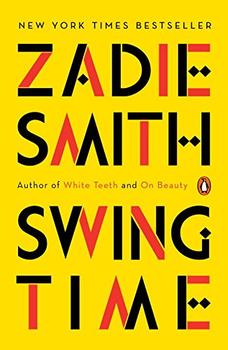Summary | Excerpt | Reviews | Beyond the Book | Readalikes | Genres & Themes | Author Bio

The piano player was called Mr. Booth. I hummed loudly along with him as he played, hoping to be heard, putting a lot of vibrato into my humming. I was a better singer than dancer - I was not a dancer at all - although I took too much pride in my singing, in a manner I knew my mother found obnoxious. Singing came naturally to me, but things that came naturally to females did not impress my mother, not at all. In her view you might as well be proud of breathing or walking or giving birth.
Our mothers served as our balance, as our foot-rests. We placed one hand on their shoulders, we placed one foot on their bended knees. My body was presently in the hands of my mother -
being hoiked up and tied down, fastened and straightened, brushed off - but my mind was on Tracey, and on the soles of her ballet shoes, upon which I now read "Freed" clearly stamped in the leather. Her natural arches were two hummingbirds in flight, curved in on themselves. My own feet were square and flat, they seemed to grind through the positions. I felt like a toddler placing wooden blocks at a series of right angles to each other. Flutter, flutter, flutter said Isabel, yes that's lovely Tracey. Compliments made Tracey throw her head back and flare her little pig nose awfully. Aside from that, she was perfection, I was besotted. Her mother seemed equally infatuated, her commitment to those classes the only consistent feature of what we would now call "her parenting." She came to class more than any other mother, and while there her attention rarely wavered from her daughter's feet. My own mother's focus was always elsewhere. She could never simply sit somewhere and let time pass, she had to be learning something. She might arrive at the beginning of class with, say, The Black Jacobins in hand, and by the time I came over to ask her to swap my ballet shoes for tap she would already be a hundred pages through. Later, when my father took over, he either slept or "went for a walk," the parental euphemism for smoking in the churchyard.
At this early stage Tracey and I were not friends or enemies or even acquaintances: we barely spoke. Yet there was always this mutual awareness, an invisible band strung between us, connecting us and preventing us from straying too deeply into relations with others. Technically, I spoke more to Lily Bingham - who went to my school - and Tracey's own standby was sad old Danika Babic´, with her ripped tights and thick accent, she lived on Tracey's corridor. But though we giggled and joked with these white girls during class, and although they had every right to assume that they were our focus, our central concern - that we were, to them, the good friends we appeared to be - as soon as it came to break-time and squash and biscuits Tracey and I lined up next to each other, every time, it was almost unconscious, two iron filings drawn to a magnet.
It turned out Tracey was as curious about my family as I was about hers, arguing, with a certain authority, that we had things "the wrong way round." I listened to her theory one day during break, dipping a biscuit anxiously into my orange squash. "With everyone else it's the dad," she said, and because I knew this to be more or less accurate I could think of nothing more to say. "When your dad's white it means—" she continued, but at that moment Lily Bingham came and stood next to us and I never did learn what it meant when your dad was white. Lily was gangly, a foot taller than everyone else. She had long, perfectly straight blond hair, pink cheeks and a happy, open nature that seemed, both to Tracey and me, the direct consequence of 29 Exeter Road, a whole house, to which I had been recently invited, eagerly reporting back to Tracey - who had never been - a private garden, a giant jam-jar full of "spare change" and a Swatch watch as big as a human man hanging on a bedroom wall. There were, consequently, things you couldn't discuss in front of Lily Bingham, and now Tracey shut her mouth, stuck her nose in the air and crossed the room to ask her mother for her ballet shoes.
Excerpted from Swing Time by Zadie Smith. Copyright © 2016 by Zadie Smith. All rights reserved. No part of this excerpt may be reproduced or reprinted without permission in writing from the publisher.
Your guide toexceptional books
BookBrowse seeks out and recommends the best in contemporary fiction and nonfiction—books that not only engage and entertain but also deepen our understanding of ourselves and the world around us.